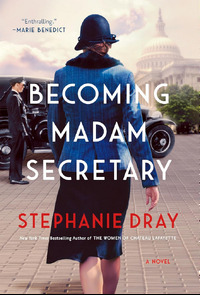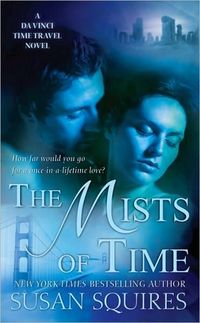"A unique and exciting combination of time-travel and Camelot, with a sense of strong love and danger."

Reviewed by Mandy Burns
Posted August 16, 2010
Romance Time Travel
Diane doesn't remember anything about her life before she
was 13 years old. Thanks to a caring social worker, she was
placed in a loving home with a normal upbringing. Diane
knows she is not normal, even the historical romance novels
she writes are lacking the normal feelings she has never
experienced. One afternoon at work, a woman gives Diane an
ancient book worth enough money to pay her rent for months,
leaving Diane with a cryptic message. Diane is to open the
door labeled "Danger" at the museum; she will know when she
is ready. The book calls to Diane with its pages full of
text and diagrams of a time-machine built by Leonardo
DaVinci. Diane decides she is ready and ventures to the
forbidden door, only to find the machine in the book.
Gawain is fully aware that Diane thinks he is a stalker,
but he is unable to stay away from her because it's his
destiny to protect her. Gawain came to this time 12 years
ago after his father, Merlin, used all his power to send
both him and Diane to this time for protection. Gawain can
see that Diane doesn't remember him, so the only way he can
convince her to trust him is to invade her dreams and make
her understand. Gawain was not born with his father's
powers, but he has learned to accept his failures. And he
is determined not to fail in protecting Diane; it has taken
12 years to find her again. Unfortunately, Diane is not
helping matters when she uses the machine and brings back a
man capable of destroying humankind.
THE MISTS OF TIME is a unique twist of time-travel and
Camelot, with a sense of strong love and danger. A very
interesting read!
SUMMARY
Diana Dearborn knows all about romance, at least in the
books she writes. But passion eludes her in real
life—until she’s offered the chance to travel back in time
to Camelot. The world of King Arthur and Guinevere is
nothing like she pictured, neither is the knight she
encounters on her return to San Francisco: Gawain, the hero
of her current project. He’s complicated, mysterious, and
sexier than anything her imagination could conjure. And he’s
been waiting for her… Now, joined together in a
desperate race, Diana and Gawain must prevent an ancient,
evil force from wreaking mayhem in the all-too-real present.
Diana must learn to trust Gawain—even while she encounters
secrets about her own past. But even if their mission
succeeds, does Diana’s destiny lie with this man from
another time—and will their love alter history
forever?
ExcerptChapter OneThe machine that lowered the casket into the
ground made a grinding noise. They really ought to oil the
mechanism. Fog rolled in as the light faded. Diana pulled
her black wool cape tighter around her shoulders. Spring in
San Francisco still seemed far away in March. A guy waited
in a small tractor-thing to scoop dirt back into the fresh
grave over by the huge camellia bush, maybe fifty feet away
from her parents’ grave. Indoor-outdoor carpet was draped
over the excavated pile, as if that would camouflage the
finality of dirt.
She looked down at her parents’ brass plaque, now three
years old. They were together finally, but she was entirely
alone. Would she ever find for herself the love they’d
shared? The fact that you adopted me is the reason I can
write romances. I knew two people who found love.
Diana heaved in a breath and pulled her eyes away from the
simple plaque. She turned and sloshed down the slope. Her
car looked lonely in the visitors’ parking lot. Fitting.
She’d always felt … separate. Maybe it was because she
didn’t know where she really belonged, since she didn’t
remember anything before she was thirteen. Or maybe it was
because she had … well, to be kind she’d call them quirks.
Like being able to find things that were lost and Susan
Squires hearing what people would say just before they said
it—not what they were thinking, just what they would say.
What use was that? It was like living inside a constant
round-robin song. And she couldn’t reveal it or people would
think she was crazy. She’d never told anyone, not even her
parents. The secret as much as the noise built a wall
between her and the rest of the world.
Sliding into the driver’s seat, she closed her eyes, hugging
her shoulder bag. Her life was getting beyond her control.
She couldn’t even write anymore. She had only twenty-five
pages done on the novel that was due next month. The whole
thing made her want to rip her hair out. Much as she loved
the setting of Camelot and her hero, Gawain, the romance
just wouldn’t come to life. She’d give back the advance and
call it a day, but the money was already gone. She was still
paying off the last year of nursing-home care for her
father. Happy endings seemed to be in short supply right
now, fictional or not.
She put her shoulder bag on the passenger’s seat beside her.
The priceless book inside had been taking up more and more
of her thoughts. It was by Leonardo da Vinci.
Yeah. That da Vinci. She’d be set her for life if she sold
it, but her horror at even the thought of selling the book
made the word “obsession” seem inadequate. She carried it
around constantly, unable to bear even leaving it at the
apartment. Okay. As long as she was admitting things, she
slept with it. But sometimes it seemed that book was the
only thing that was real to her anymore.
Whoa. Obsession over a book, writer’s block. She had to
admit she’d been depressed. All on top of her little natural
proclivities … she needed a therapist. As if she could
afford one. Unless she sold the book. But she probably
couldn’t sell the book without some serious therapy. Well,
that was circular.
She took two deep breaths and started the car. Okay. Time to
go home to her little apartment just east of the Mission
District. Unable to help herself, she reached over to touch
the book. The way it had come into her life was a little
surreal. …
Diana had been coming out of the office at the
Exploratorium, the children’s science museum where she
supervised docents, when she practically ran into the
family. The woman had very green eyes and very red hair and
that translucent, perfect skin that goes with them. Her baby
bump was just beginning to show. The little girl was a paler
version of her mother. The father was a looker. Anything in
range with a female hormone was casting surreptitious looks
at him. He ought to be standing at the prow of a Viking
ship, preferably stripped to the waist.
“Closing time,” Diana announced.
The Viking’s next words echoed in her mind: “We’ll just stop
at the restrooms before I take my two girls home.” He
gathered the little girl into one big arm and took his
wife’s elbow protectively.
The woman took one look at Diana, gasped, and slumped
against her husband.
“Lucy, are you all right?” The Viking hauled her in against
his free hip.
Diana guided them to a bench beside the door marked with a
large sign that read: Danger. Keep out.
The little girl was worried. “What’s wrong with Mommy?” she
asked in a small voice.
“Nothing, honey,” the woman called Lucy managed as she eased
down on the bench. “Mommy didn’t eat enough at lunchtime.”
She clutched a large shoulder bag to her chest.
The Viking’s gaze swept the area. “Can you look after Pony?”
he asked Diana, setting the little girl on her feet. “I’ll
buy a mug at the gift shop and bring some water.”
Diana grabbed Pony’s hand, and the Viking strode away. Pony.
Odd name, but cute.
The woman examined Diana’s face. “Have … have you been a
docent long?”
A connection sparked between them. Did Diana know her? “I’m
actually a supervisor. It pays the bills while I wait for my
ship to come in.” “
And what exactly would your ship look like?”
Diana mustered a smile “Well … I write books.” She looked up
to see the woman’s expression of sympathy. Everybody and
their brother was a failed writer these days. “Oh, I’m
published,” she assured the woman. “But it doesn’t come with
health insurance or a four-oh-one (k). City of San Francisco
provides those.”
“What do you write?” Now she’d see the flash of derision
or the uneasy shifting of the eyes. “Romances.” Did she
sound defensive? “I write historicals.” Not even a hint of
eye rolling. Emboldened, Diana continued. “Right now I’m
researching Camelot. I think it was the origin of courtly
love.” She sighed. “That was the time to live.” She couldn’t
help the longing that drenched her voice. Lucy gave a
sharp intake of breath. She looked as though she’d just had
a revelation. The Viking strode toward them with his cup of
water, a worried frown creasing his brow. The woman smiled,
first at him, and then at Diana. A look Diana could only
describe as sureness suffused her expression. “I have a gift
for you.” She hauled a very large leather-bound book from
her bag and handed it to Diana. “This … this is old. I … I
couldn’t take this.” The tooled leather binding was
beautiful. “Of course you can. I’m giving it to you just
as it was given to me.” The woman glanced to her husband and
stilled what Diana was sure was an incipient protest with a
look. Diana opened the book gingerly, scanning the pages.
“It’s written backward.” “Yes. It’s in archaic Italian and
Latin.” Diana frowned. “I have some Latin, but I’m afraid
I don’t read Italian.” “You can get a translation from Dr.
Dent over at Berkeley. He’ll authenticate it.” The woman
rose, looking strangely serene. “I’m feeling fine. We can
go.” Diana caught her husband’s pointed look at the Danger
door. “I’ve done what I came to do,” his wife assured him.
The woman pressed Diana’s hands. “Use the book. It will
change your life. And when you’re ready …” She leaned
forward to whisper in Diana’s ear. “Look behind the
door.” Diana drew back in shock, then glanced to the door
marked: Danger. “Yes. That one.” The woman smiled. And
then she and her family strolled out into the San Francisco
fog. The whole scene looked like the fade-out happy ending
to a movie. Diana jerked her head around as a car honked
and sped by on her left. Once she’d read Dr. Dent’s
translation, Diana knew what Lucy thought was behind that
door. The very fact that Diana could half-believe it must be
a sign that she was going around the bend. The book was a
hoax, even if it was a hoax by Leonardo da Vinci. The
manuscript recorded Leonardo’s effort to build a time
machine. It said he succeeded. There was a picture on the
last pages, after all the diagrams and calculations and all
the scientific stuff she didn’t have any hope of
understanding. In the illustration the machine seemed to be
just a bunch of gears. Susan Squires Appropriate for 1508
when the book was written, but not exactly the kind of thing
that could manipulate the time/space continuum. It would
be easy to check it out. As a supervisor of the docents she
had a set of master keys. But in the five months she’d had
the book she’d never used them on the door. Opening it,
thinking there might be a time machine behind it, seemed
like crossing some line toward insanity. Like it wasn’t
crazy to carry the book around all the time. Or to sleep
with it. Okay. A little crazy. But it was like the book
was shouting at her now, where before it had only whispered.
That made it harder to think clearly. Still she wouldn’t
believe a time machine was hidden in a children’s
museum. Oh, hell. If she didn’t believe there might be a
time machine might behind that door, why had she brushed up
on Latin? Because that was what they spoke in Camelot as a
second language to Brythonic Proto-Celtic? Because she
wanted there to be a time machine behind that door and she
wanted it to take her back to Camelot, to a time when things
were simpler, when anything could happen and people believed
in love and magic and honor. As she researched her newest
novel she’d grown to feel like she belonged there, and she,
who had no childhood, wanted so much to know where she
belonged. Her chest heaved and she couldn’t seem to get
air. She glanced over at the book. It exuded hope. It seemed
to push at her, like maybe it could make her happy, like the
redhaired Lucy said it could, like maybe deadlines and
obsession and loneliness were what was unreal and there was
some new and wonderful reality just waiting for her. That
was dangerous. Sanity was knowing reality for what it was,
no matter how stark, and learning to cope with it. If there
were no machine that could change your life behind that
door, then she’d be able to go home to her empty apartment,
make an appointment with a therapist at some free clinic,
and face her future. So she knew what she had to do. She
was going to the Exploratorium tonight and look behind that
door marked: Danger. Diana parked in the front lot, close
to the museum entrance. The fog was a blanket down here near
the bay. The ornate colonnades that lined the path to the
Rotunda of the Palace of Fine Arts loomed to her left, the
angels on the capitals looking more like gargoyles in the
mist. The Palace had been restored a couple of years ago for
the umpteenth time, on this occasion to make it earthquake
proof. Originally built for the Panama-Pacific International
Exhibition of 1915 as a temporary building, it had never
been meant to stand the test of time. Excavations to install
the reinforcing struts had revealed a basement of sorts, a
secret room now buried again to protect the earthquake
infrastructure. Diana pulled out her keys and unlocked one
of the front doors. The beam of Clancy’s flashlight caromed
over the cavernous ceiling. He was about to call out to
her. “Hey!” he called. “You’re here late.” She managed a
nervous grin. “Forgot to post this week’s docent
schedule.” Clancy had a gut on him, but his perpetual
frown, lurking among his jowls, hid a kind heart. “Can’t
have that.” He grinned. “But, Ms. Dearborn, you got to get a
life.” Wasn’t that the truth? Her face fell. If only she
knew how. She heard his words, of course, before he said
them. How kind he was about to be. “Well, you don’t have
to get one right this minute. You Susan Squires take your
time.” He must have seen her expression. “I’m due to take a
turn around the outside. I’ll escort you to your car when I
get back.” “Thanks, Clancy.” He turned out toward the
rank of double glass doors. “Don’t you open these doors
until I get back,” he warned. She gave a little nod.
Clancy would be gone for half an hour at least. She checked
her watch. Three minutes past seven. Standing in the
entryway to the exhibits, she watched him push through the
doors and cast his flashlight through the wall of fog. She
spun on her heel. The exhibits were silent now. The machine
that mimicked waves was still. The simulated geysers were
cold. Work lights in the back cast a harsh glow that barely
illuminated the shapes of the exhibits that marched off into
the darkness. The mezzanine that housed the aural and
biology exhibits loomed over her. Best get this over with.
She made her step purposeful as she strode past the gift
shop, its dark recesses crammed with souvenirs. She clutched
her bag with the book in it to her chest. She didn’t have to
read the personal instructions to someone named Donnatella
in the front pages. She knew the translation by heart. The
note said … that time was a vortex. That you could think of
another time and the machine would … would take you there. O
h, right, and how was that? And that the machine couldn’t
stay in the new time forever. It would slip back to its
point of origin. There was the little slip of paper, almost
like a bookmark, that gave the sequence of the switches to
flip on the power source. There was a dire note from someone
named “Frankie” that said you shouldn’t ever meet a former
version of yourself because you couldn’t both exist at once.
Both of these were recent and in English. The door loomed
before her. Danger. Keep out. Danger, all right. She took
a breath. Best get it over with. She glanced back to the
entrance. Clancy was nowhere in sight. This door was on the
side of the museum next to the Palace of Fine Arts. Maybe
something to do with the construction? She pulled out her
key ring and sorted through the keys. Damn. Her hands were
shaking. She held up her ring by the master key, the rest of
the keys clinking for attention. Then she descended on the
lock. The book almost hummed with excitement inside her bag.
The very air around her seemed to vibrate with
expectation. The door was heavy but silent on its hinges.
Diana peered into the dark passage that sloped slightly
downward. She flicked on the little LED light attached to
her key chain. The corridor was lined with unfinished
dry-wall. The floor turned from cement to rough boards. She
stepped inside, her steps echoing. The boards gave way
almost immediately to packed earth. The door behind her
slammed shut. She swallowed, trying to push her heart out of
her throat and back down where it belonged. That door better
have a handle on the inside. But she wasn’t going back to
check now. If she stopped now, she might lose her
nerve. Her eyes got used to the illumination cast from her
tiny light. A black gap yawned at the end of the corridor.
She stood on the edge of that gap and held her light out.
Several metal girders set at angles loomed out of the
darkness. Earthquake reinforcements for the Rotunda. She
must be directly below it in that basement they’d
discovered. She cast her light around. Other struts jutted
at crazy angles out of concrete roots. She ducked under one
and around another. It was like a maze, smelling of metal
and damp from the lake beyond the Rotunda. She was so
absorbed in making her way through the forest of metal
girders she was surprised when she emerged into an open
space. Something gleamed dully in the darkness. She held
her little light above her head. Her lungs grabbed for
air. The gears were bronze or brass or something, a
thousand of them, big and smaller and really tiny. And they
were set with jewels. Some were really, really big jewels.
Red and blue and green and … and diamonds. They coruscated
under her tiny light. The machine must be fourteen, sixteen
feet tall. It disappeared in the darkness above her.
Stabbing out from the center was the control lever she’d
seen in the illustrations, ending in a diamond bigger than
her fist. Leonardo’s machine was real. And she just
knew. She knew that the Viking-looking guy was really a
Viking from long ago and the woman, Lucy, had gone back to
get him and changed her life with this machine. You could
make these gears and jewels take you through the vortex of
time just by thinking about a destination. The book inside
her shoulder bag seemed almost jubilant. Diana put out a
hand to the nearest girder to steady herself and took some
deep breaths. Then she examined the machine more carefully.
A modern steel box about the size of a lunch box sat at the
bottom with several switches and lights on it and a big
steel button like the kind you pushed with your palm at
traffic lights. That hadn’t been in the illustration. But
the instructions on the bookmark mentioned switches. She
hauled the book out of her bag and took the slip of paper
out, shining her light on the spidery handwriting: “Blue,
then the two whites from left to right, twice, and then the
red. Push the big button. Then pull the lever down.” This
was the moment. She could see Arthur and Guinevere. She
could see Gawain, the hero who wouldn’t come to life in her
current work in progress. She could be infused with that
“one brief shining moment” and come back with a tale to
tell. She might be renewed.
What do you think about this review?
Comments
No comments posted.
Registered users may leave comments.
Log in or register now!
|







 © 2003-2025
© 2003-2025